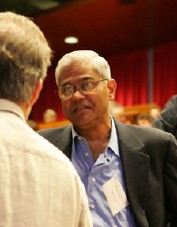Personal tools
News from ICTP 110 - Profile

Jagadish Shukla's multifaceted career has found success across the continents both in science and service to society.
Weather to Change

In an extraordinary life and
career that began in a small impoverished village in eastern India
and continues to unfold today in suburban Washington, DC, Jagadish
Shukla has applied his diverse talents and skills over the
past four decades to scientific research, scientific institution
building and service to society, pursuing his broad ambitions
on three continents---North America, Europe and Asia.
At ICTP, Jagadish Shukla is best known for launching and then
heading the Centre's Weather and Climate research and training
activities from their inception in 1988 until Filippo Giorgi assumed
responsibility for this initiative in 1997.
Yet Shukla has also distinguished himself as a scientist who has
divided his time over the past two decades between George Mason
University in Fairfax, Virginia, where he is chairman and professor
of climate dynamics, and the Center for Ocean-Land-Atmospheric
Studies (COLA) in Calverton, Maryland, USA, a nonprofit research
centre that receives more than US$3 million in annual funding
from the US National Science Foundation, the National Oceanic
and Atmospheric Administration (NOAA), and the National Aeronautics
and Space Administration (NASA). Shukla founded and now directs
the internationally recognised Center, which currently has a staff
of 25 scientists and 15 doctoral students.
More recently, Shukla has decided to devote a small portion of
his time and money to his native village of Mirdha, situated in
India's most populous state Uttar Pradesh, home to 200 million
people, which would make it the fifth most populous country in
the world if it were an independent nation.
Shukla's education began modestly. "My first lessons,"
he recalls, "took place in the open under a banyan tree.
In the fifth grade I attended a one-room school house built with
the help of my father. And from the sixth to the tenth grade,
I walked 10 kilometres each day to attend secondary school, where
I studied Hindi, Sanskrit and mathematics. Science was not part
of the curriculum."
A summer of intense reading of grade-school textbooks in science,
which his father encouraged him to do, allowed Shukla to do well
enough to pass the entrance examination for admission to the eleventh-grade
science class in the city of Balbia. For his undergraduate and
graduate education, he went to Benares Hindu University where
he ultimately earned a doctorate in geophysics.
Shukla was destined to lead a conventional life as a government
employee in India (upon graduation, he obtained a civil service
position in Pune) when a last minute trip to Japan to attend a
conference transformed his career. There the 24-year-old Shukla
met Jule Charney, professor of meteorology at the Massachusetts
Institute of Technology, USA, and, at the time, the world's most
eminent meteorologist.
"For reasons that remain unclear to this day, Charney came
to me and began to discuss my presentation. This chance encounter
with a world-class scientist ultimately led to a doctorate in
meteorology at MIT."
Shukla's studies and, more importantly, modelling experiments
at MIT and subsequently at NASA led him to a breakthrough concept
in climate predictability. "No one," he explains, "can
predict the weather beyond five to 10 days. Yet, ironically, climate
is predictable. In other words, science cannot tell you what the
temperature will be two weeks from now but science can be used
to predict what the mean seasonal temperature will be six months
from now." Shukla's investigations, conducted during the
1980s, were among the first to prove this point.
The reason that such calculations can be made is that changes
in the ocean temperatures directly affect the temperature of the
air locally as well as globally. Using a deep understanding of
the physics of climate and feeding large quantities of data into
state-of-the-art computers, scientists can integrate complex mathematical
models to simulate and predict climate variations.
"The temperature ties between the oceans and land and the
overlying atmosphere are strongest in tropical regions near the
equator, which makes tropical climate variations far more predictable
than other regions," Shukla observes. "This relationship
is a 'gift of nature' that many developing countries have not
been able to take advantage of because they lack the scientific
expertise and resources to do so."
That was the explanation Shukla gave to Abdus Salam during a conversation
in 1992 that soon led to a series of ICTP workshops and conferences
in the physics of weather and climate and ultimately to the creation
of today's Physics of Weather and Climate group.
"The initiative," explains Shukla, "was designed
both to build scientific capacity in the physics of weather and
climate in the developing world and to make the information gathered
by scientists available to countries that could then put the information
to work to improve crop yields, for example."
Soon after he relinquished responsibility for the Centre's weather
and climate activities, Shukla embarked on yet another 'adventure'
when he decided to "give something back" to the village
of Mirdha where he grew up and where most of his family, including
his brother Shri Ram, still lives.
Why does he lend a helping hand to his home village? "My
efforts are not only intended to improve the lives of people in
Mirdha but also to alter the mindset: to show people that change
is possible and that some degree of change can be good."
To advance his goals, Shukla has recently decided to devote 10
percent of his time in Mirdha, matching his previous commitment
of 10 percent of his salary.
"Giving of myself has more been difficult than giving my
money," he admits. "After five days at a house without
electricity or running water, I often find myself looking for
a comfortable hotel. Change is difficult but possible," he
notes, "and I'm the living proof that change changes us all."